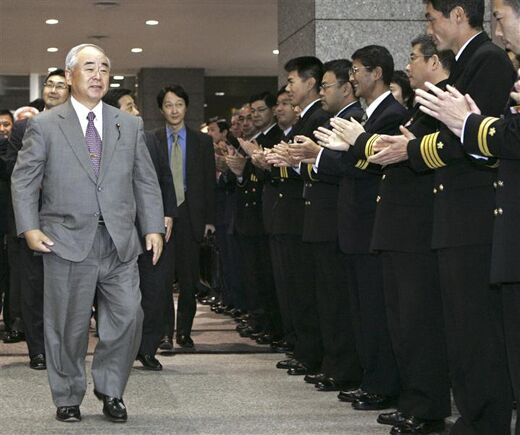
Japan—on the Rise Again
After a decade of economic slough, Japan is surging back. Amid signs that it is maintaining its economic recovery, the land of the rising sun recently took two significant steps toward shaking the bogeyman of its World War ii legacy and reasserting Japanese nationalism.
On Friday, December 15, the Japanese Parliament passed a bill that upgraded the Japanese Defense Agency to full ministry status. This takes the new Japanese Defense Ministry into the cabinet arena along with other top government departments. Significantly, the defense bill enjoyed the support of the Diet’s main opposition Democratic Party, making it, with the exception of two minor opposition parties, a virtual bipartisan affair.
All that now remains for Japan to finally legitimize itself as a fully fledged member of the international community empowered by parliamentary authority to act militarily, both defensively and offensively, beyond its own shores, is to change Article 9 of its postwar constitution which, in theory, presently prevents Japan from so engaging. Shinzo Abe is on track to obtain that change during his first tenure as prime minister.
Barely an hour following this historic change in the Japanese government, another bill was approved along party lines requiring schools to teach patriotism. Consistent with Prime Minister Abe’s efforts to have Japan shed remaining taboos associated with the nation’s inglorious defeat in World War ii, the Japanese leader had made this legislation a key plank in his political platform. He understands clearly that the old generation that still remembers that huge national loss of face is dying out. The new generation needs a fresh focus on the nation’s future. To this end, schools will now be charged with the responsibility to generate and instill a new sense of national pride in their students.
This particular bill did not pass without some controversy. “The education bill calls on teachers to teach students about ‘respecting tradition and culture and loving the nation and homeland.’ Liberals say that patriotic education has echoes of imperialist Japan during World War ii when the emperor was considered a demi-god” (Channel NewsAsia, December 16). Nevertheless, the bill is now law.
Adding prestige to Japan’s rising sun on the international front, Jordan’s King Abdullah ii has called on that nation to become more heavily involved in the most volatile theater of international relations, the Middle East. Channel NewsAsia reported December 19 on what the Jordanian monarch wants on his agenda with Abe during their upcoming first meeting: “Abdullah said he wants to discuss what Jordan and Japan can do jointly for the conflict-battered region ….” cna quoted the king as saying, “So with the new prime minister, I think we will be discussing Iraq and I would like to discuss challenges the Palestinians face and Lebanon faces, and then see what we can do together to alleviate a lot of these social and economic sufferings, but also coordinate a lot on political aspects.”
King Abdullah referred to Japan as not only probably the region’s strongest donor “socially and economically,” but also “probably the most honest broker for the Middle East.” With the United States, Britain, Russia and the European Union all struggling to play a part in defusing the volatile Middle East, King Abdullah has now placed Japan squarely in the ring with all other major players in the highest-profile region in geopolitics. Keeping in mind the importance of gulf oil to resource-deficient Japan, this endorsement should go far in enhancing Japan’s credibility in the eyes of the opec cartel and may help smooth the path to oil deals more favorable to the Japanese in the face of stiff competition from oil-importing countries.
Further boosting Japanese morale, India’s Prime Minister Manmohan Singh, during a visit to Japan two weeks ago, agreed with Prime Minister Abe on the establishment of a “Strategic and Global Partnership” involving “closer political and diplomatic coordination on bilateral, regional, multilateral and global issues, comprehensive economic engagement, stronger defense relations, greater technological cooperation as well as increased cultural ties, educational linkages and people-to-people contacts” (Japan Times, December 20).
With both India and Japan seeking permanent seats on the UN Security Council, the two together with China representing Asia’s three strongest economies—all three pursuing increasing trade with each other—and Japan beginning to consider the previously unthinkable (joining the Asian nuclear club)—the signs are already there of the formation of a two-tier Asian region, with Southeast Asia set to be dominated by a consortium composed of China, India and Japan.
As the U.S.’s impact as a unipolar power rapidly wanes, a new global order is emerging. These three Asian giants are carefully colluding to set the pace for the development of a huge Asian power bloc that will carry much clout within that global order. On the northern periphery, Russia, having done its brief and economically convenient fling with the West, is set to add its weight to this huge Asian combine.
Of the four, it is Japan that is historically positioned to dominate Southeast Asia and rope the second-tier economies of this region into a consolidated Far Eastern bloc. This prospect is consistent with the prophecy outlined in Ezekiel 38:6.
Watch Japan. The flag of the rising sun flies a little higher and a little more proud with each passing month.
